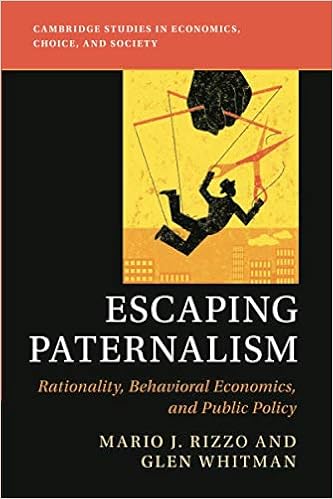by Mario J. Rizzo and Glen Whitman
Book description
The burgeoning field of behavioral economics has produced a new set of justifications for paternalism. This book challenges behavioral paternalism on multiple levels, from the abstract and conceptual to the pragmatic and applied.

Behavioral paternalism relies on a needlessly restrictive definition of rational behavior. It neglects nonstandard preferences, experimentation, and self-discovery. It relies on behavioral research that is often incomplete and unreliable. It demands a level of knowledge from policymakers that they cannot reasonably obtain. It assumes a political process largely immune to the effects of ignorance, irrationality, and the influence of special interests and moralists.
Overall, behavioral paternalism underestimates the capacity of people to solve their own problems, while overestimating the ability of experts and policymakers to design beneficial interventions. The authors argue instead for a more inclusive theory of rationality in economic policymaking.
Reviews
Gerd Gigerenzer (Director of the Harding Center for Risk Literacy, Max-Planck-Institut für Bildungsforschung, Berlin):
Taking issue with the narrow norms of rationality in much of behavioral economics, this remarkable book argues in favor of an inclusive concept of rationality and is one of the first to cover the full range of relevant empirical evidence from psychology. Escaping Paternalism promotes a serious attempt to understand why people do what they do.
Richard Epstein (Laurence A. Tisch Professor of Law, New York University):
Mario J. Rizzo and Glen Whitman have written an incisive yet accessible critique of the dominant strain of behavioral economics associated with Daniel Kahneman, Richard Thaler and Cass Sunstein. Rizzo and Whitman are wise enough to know that human beings, with quirks and practices, are ‘people, not puppets’. Yet they show how classical liberal principles of governance do far better in organizing social arrangements than the various forms of soft paternalism now in vogue with so many behavioral economists.
Robert Sugden (University of East Anglia):
Mario J. Rizzo and Glen Whitman present a powerful and well-documented critique of behavioural economists’ justifications of paternalism. They argue convincingly that these justifications illegitimately presuppose that rational-choice theory is a normative standard. Inspired by the psychology of Gerd Gigerenzer, they offer a more pragmatic and ‘ecological’ understanding of human rationality.
Tyler Cowen (George Mason University) via Marginal Revolution:
The authors are Mario Rizzo and Glen Whitman, and the subtitle is Rationality, Behavioral Economics, and Public Policy. This is the most comprehensive, definitive attempt to respond to paternalism and nudge that I have seen, written from a (mostly) libertarian and partially Austrian perspective.

[…] Escaping Peternalism. One of the authors Mario Rizzo is an Austrian economist and one of my agents of influence in New York. […]
It is grand to see this book now in print. Congratulations to Mario and Glen.
Like Jerry O’Driscoll, great to see this book published. I’ve ordered it and am impatiently waiting for it to arrive. However, I searched the book via Amazon’s website with many keywords (very impatient indeed to know what is inside!), but was surprised that my search for “Kant” yielded no result, especially as Mario wrote a nice post about Kant and behavioral economists in the past (https://thinkmarkets.wordpress.com/2009/12/18/why-kant-was-smarter-than-behavioral-economists/) – although he expressed some reservations in the comment section.